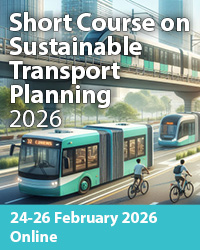Description
Mobility is a complex, cross-cutting, and multifactorial process. It requires coordinated and synergistic action amongst various stakeholders, from central and local government, the private sector, academic institutions, and, of course, civil society as a whole.
From a technical perspective, the course aims are to obtain insights in the following topics:
- Territorial planning, based on Transit-Oriented Development
- Public management of the diverse transportation modes (train, subway, tram, bus, non-motorized vehicles, pedestrian traffic, etc.) and their integration as a system
- Linking the various systems for multimodal mobility
- A better quality public space, based on urban-architectural design, integration with the landscape, and the creation of places with identity.
Approach & Scope
The course is based on an interdisciplinary and multidisciplinary perspective, addressing the planning, design, management, implementation and operation of sustainable urban mobility modes at various territorial scales, from regional and metropolitan areas, to district, and local zones.
Target Audience
Transportation engineers, architects, civil engineers, systems engineers, lawyers, economists, sociologists, geographers, political scientists, among other professionals, with some experience in public management, consulting, or research.
Added Benefit
The course draws on recent references from projects implemented in some iconic Latin American cities such as Mexico City, Bogota, and Lima (airports, trains, metros, BRT, cycle paths, public spaces, and pedestrian traffic).
Programme
Day One (6 hours)
- Transit Oriented Development.
- Land Use & Density, mixed-use development, and pedestrian-friendly design. New Trends in Housing Prototypes.
- Financing, public-private partnerships, and community engagement.
- Zoning laws, building codes, and transportation regulations.
Day Two (6 hours)
- Public Management of a Multi-Modal System.
- Central & Local Institutional Management.
- Territorial Management (Metropolitan areas).
- Project Portfolio.
- Data Management.
- Operation Monitoring.
- Political decision-making.
Day Three (6 hours)
- Urban & Architectural Design.
- Built and Natural Environment.
- City Branding & Landmarks.
- Cycle Lanes and Pedestrian Routes
- Public Space & Transport Stations
- Way-Finding – Signage & Digital Navigational Systems
Presenter
The course will be presented by Dr Jorge Diaz, an architect from Ricardo Palma University who holds a master's degree and doctorate in Urban Planning from the Autonomous Metropolitan University.
His professional career spans more than 30 years in the Americas, Europe, and Africa and he has provided technical assistance to local governments, United Nations agencies, the private sector, and academic institutions.
Dr Diaz has been committed to enhancing mobility, especially in Latin America, by bridging the gap between science-based knowledge and decision-making which usually takes place on the political arena.
His approach also favours user-based planning and design processes, which is why information gathering begins with interviews and surveys of the various profiles of transport service users.
Finally, Dr Diaz's experience is based on a multidisciplinary understanding of cities as complex systems that require technical considerations but are also sensitive to human beings and their perception of public transport services.
Implementation requires the project to have ‘social licence’, which is why this premise is fundamental in the course led by Dr Diaz.


 Wessex Institute
Wessex Institute